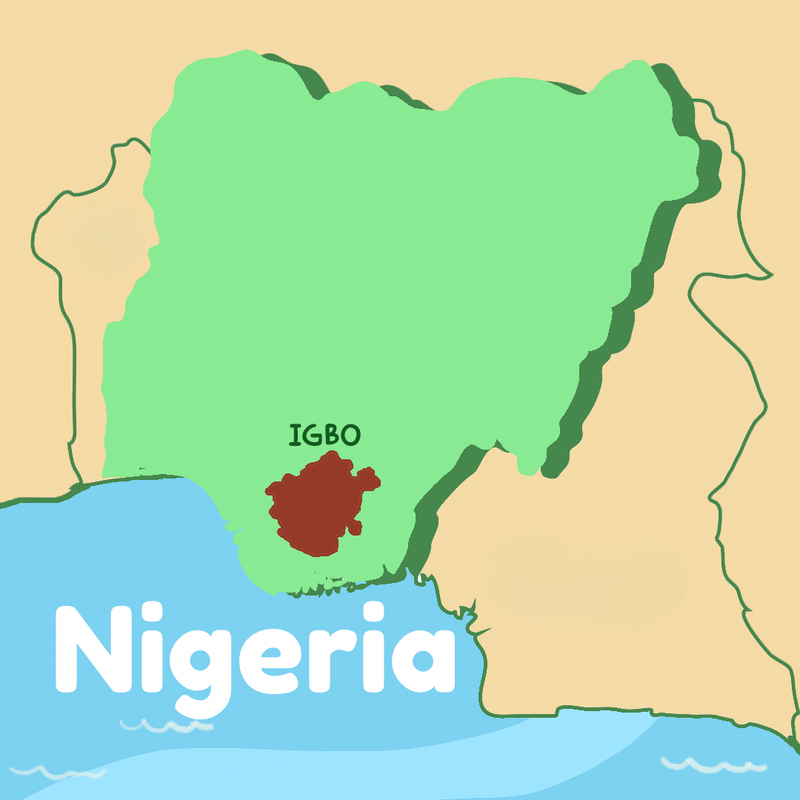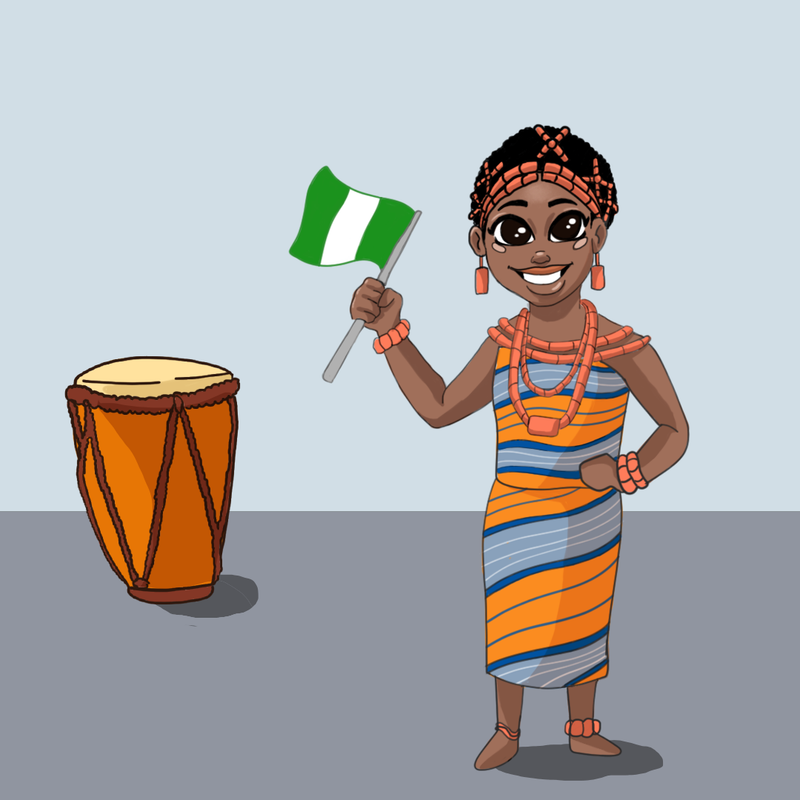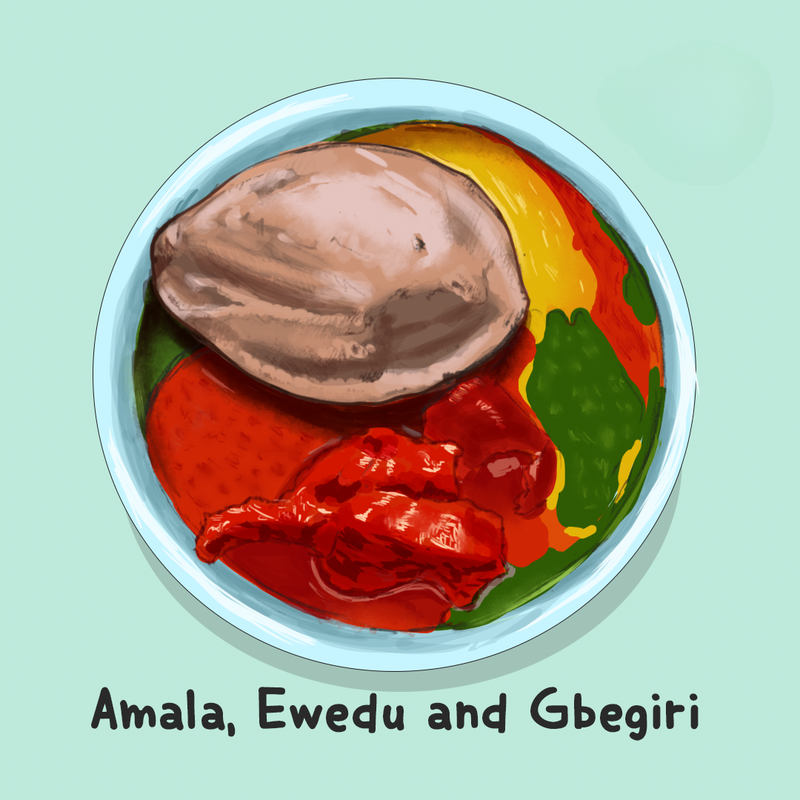Meet The Igbo People!

The Igbo people are one of Nigeria’s largest ethnic groups, known for their strong sense of community, deep traditions, and love for storytelling. They have a history of trade, craftsmanship, and innovation that continues to shape Nigeria today!
WHERE
Mostly in southeastern Nigeria.
LANGUAGE
Igbo, with over 20 dialects spoken in different communities.
KNOWN FOR
Market days, the kola nut tradition, and their famous apprenticeship system, where young people learn from business mentors.
The Igbo Calendar & Market & Days

The Igbo people follow a four-day calendar, which has been in use for centuries. Each day—Eke, Orie, Afor, and Nkwo—marks a unique part of the cycle. While all days are important, every village or town selects one of these days as its major market day, when people travel from nearby areas to buy and sell goods, exchange news, and celebrate their community.
Igbo markets were (and still are) vibrant places where people trade everything from yam and palm oil to fabrics and handcrafted jewelry. In the past, these markets also played a role in social gatherings, dispute settlements, and traditional ceremonies.
Because market days were such a big part of life, many Igbo children were named after the day they were born. These names have variations based on gender and dialect:

- "Okon-" names (e.g., Okonkwo, Okorie) traditionally mean "Man born on [market day]."
- "Nwa-" names (e.g., Nwankwo, Nwafor) mean "Child born on [market day]."
- "Mba-/Mg-" names (e.g., Mgbeke) are typically used for girls born on those days.
Market day names are still common today, connecting Igbo people to their heritage and traditions.
The Kola Nut - A special Welcome

In Igbo culture, offering a kola nut (oji) is one of the highest signs of respect. When someone visits a home, the host welcomes them with kola nut as a way of saying, "You are honored here."
- Before breaking the kola nut, a prayer is said, asking for blessings, peace, and goodwill. This is called the Igwo Oji tradition.
- The kola nut is shared with guests, and in some cases, visitors take a piece home to tell others about their visit.
- It is also used in special ceremonies, weddings, and important meetings.
What is Umu ada?

In Igbo culture, "Ada" is a name and title that means "first daughter". The Ada is often seen as a leader among her siblings and is expected to uphold family traditions, offer guidance, and represent her family with dignity.
The Umu Ada (meaning "Daughters of the Family" or "Daughters of the Land" ) refers to all the women born into a particular family or community, no matter where they live. Even after marriage, an Igbo woman remains connected to her father’s family as part of their Umu Ada.
- They protect family traditions – Umu Ada play a key role in family gatherings, weddings, and ceremonies.
- They settle disputes – When conflicts arise in the family, Umu Ada are called to help find a solution.
- They support their communities – In many Igbo villages, Umu Ada organize projects to help people in need.
Even today, Umu Ada groups are found all over the world, helping Igbo families stay connected no matter where they live!
About Nigeria

Where is Nigeria? West Africa
Flag: Green (agriculture & prosperity), White (peace & unity)
Official Language: English, but Nigeria has over 500 languages!
Currency: Nigerian Naira (₦)
Famous Nigerians
Nigeria is home to many trailblazers who have made history across different industries.
- Chinua Achebe – One of the greatest African writers (Things Fall Apart)
- Ngozi Okonjo-Iweala – First African woman to lead the World Trade Organization
- Chimamanda Ngozi Adichie – Award-winning author (Half of a Yellow Sun)
- Jidenna – Musician and cultural ambassador
- Hakeem Olajuwon – First African basketball player inducted into the NBA Hall of Fame
- Professor Wole Soyinka – First African to win the Nobel Prize in Literature
- Dr. Stella Adadevoh – Doctor who stopped the Ebola outbreak in Nigeria
- Anthony Joshua – World champion boxer
The People of Nigeria

Nigeria is a diverse country with over 250 ethnic groups and more than 500 languages! The three largest groups are:
- Hausa-Fulani – Mostly in the north, known for trade and Islamic scholarship.
- Yoruba – Found in the southwest, known for their artistic and religious traditions.
- Igbo – Found in the southeast, famous for their market culture and entrepreneurship.
But that’s not all! Other groups include the Ijaw, Tiv, Kanuri, Nupe, Itsekiri, Ibibio, Urhobo, and many more—each with its own unique language and traditions.
Food You Must Try in Nigeria!

- Egusi Soup – A rich, nutty soup made with ground melon seeds, often served with pounded yam.
- Amala & Gbegiri – A southwestern Nigerian favorite, Amala is a smooth, dark yam flour meal paired with Gbegiri, a delicious bean-based soup
- Edikang Ikong – A highly nutritious vegetable soup made with fresh leafy greens and assorted meats, popular among the Efik and Ibibio people.
In Nigeria, food is more than just a meal—it’s a celebration of culture and family!
Other Cool Facts About Nigeria

- Nigeria is the most populous country in Africa, with over 200 million people.
- Lagos is one of the fastest-growing cities in the world, and it never sleeps!
- Nigeria’s film industry, Nollywood, produces more movies than Hollywood each year!












